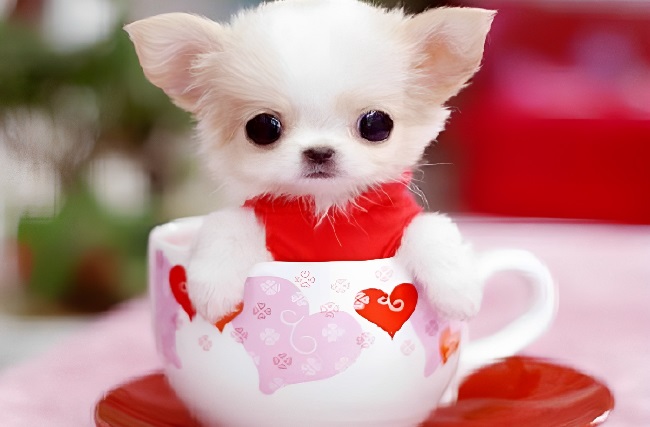The allure of a tiny, cuddly dog that fits into a teacup is hard to resist. Teacup Dogs, incredibly small breeds often weighing 5 pounds or less, have become increasingly popular due to their adorable size and the convenience of their minimal space needs.
However, owning a teacup dog is not merely about cuteness overload; it requires understanding their specific needs and providing them with appropriate care.
In this article, we delve into the top 10 breeds of Teacup Dogs and offer tips on how to care for these tiny companions.

The Top 10 Teacup Dog Breeds
Here is a list of top 10 cute Teacup Dogs you can keep as pet:
Read Also:
1. Teacup Chihuahua
The teacup Chihuahua, one of the smallest dog breeds, is known for its big personality packed into a petite body. These dogs are affectionate, energetic, and fiercely loyal to their owners.
2. Teacup Pomeranian
Pomeranians are known for their fluffy coats and lively disposition. Their teacup variant retains all the charm but comes in a significantly smaller package.
3. Teacup Yorkshire Terrier
Teacup Yorkshire Terriers, or “Yorkies,” maintain the assertive and energetic personality of their standard counterparts. These tiny dogs can make great companions but also require a good deal of attention and care.
4. Teacup Maltese
Renowned for their striking white coats and gentle demeanor, Teacup Maltese dogs make fantastic pets. They’re typically very loving and enjoy the company of their owners.
5. Teacup Poodle
Despite their diminutive size, Teacup Poodles carry a high level of intelligence and are known for their trainability. They also come in a variety of colors, making them a popular choice among teacup dog enthusiasts.
6. Teacup Shih Tzu
These dogs are known for their affectionate nature and flowing coats. Teacup Shih Tzus are perfect lap dogs, enjoying nothing more than relaxing with their owners.
7. Teacup Pekingese
Pekingese are royal dogs in a tiny package. They are loving and loyal, making them great companions, though they can be a bit stubborn at times.
8. Teacup Papillon
Despite their small size, Teacup Papillons are agile and active. They carry a distinctive butterfly-like appearance due to their long, fringed ears.
9. Teacup Dachshund
Teacup Dachshunds maintain the spirited and tenacious nature of the standard Dachshunds. They are loyal to their families and can make excellent watchdogs despite their small size.
10. Teacup Bichon Frise
The Bichon Frise is known for its fluffy white coat and cheerful disposition. Teacup Bichons are friendly and sociable dogs that make great companions for families and seniors alike.
Caring for Teacup Dogs: Size-Specific Needs
Teacup Dogs require specific care due to their small size. They can be more prone to health problems and injuries, so it’s essential to understand their needs and provide appropriate care. Here are some tips to keep your teacup dog healthy and happy:
Health Care
Teacup Dogs can be more susceptibleto certain health conditions like dental issues, heart problems, and bone fractures. Regular vet check-ups and a diet tailored to their unique nutritional needs can help maintain their health.
Safety Precautions
Due to their small size, Teacup Dogs can easily get injured. They are more vulnerable to accidents like falls or being stepped on, so it’s crucial to always be mindful of their location and handle them with extreme care.
Training
Although Teacup Dogs might seem like they don’t require training due to their size, this is a misconception. Training and socialization from a young age are essential to ensure they grow up to be well-behaved and sociable dogs.
Grooming
Grooming requirements vary among teacup breeds. Some, like the Pomeranian and Maltese, require regular brushing to maintain their coats, while others need less maintenance.
Regular grooming not only keeps your teacup dog looking great but also allows you to check for any skin problems or abnormalities.
Read Also:
Conclusion
While Teacup Dogs can provide companionship and joy, owning one comes with responsibilities. Recognizing their specific needs and dedicating the time and effort to meet them is vital for their well-being.
It’s always recommended to research and consult with a trusted vet or breeder before bringing a teacup dog into your home. With the right care and love, these tiny creatures can bring immense happiness and fill your life with their endearing presence.
























